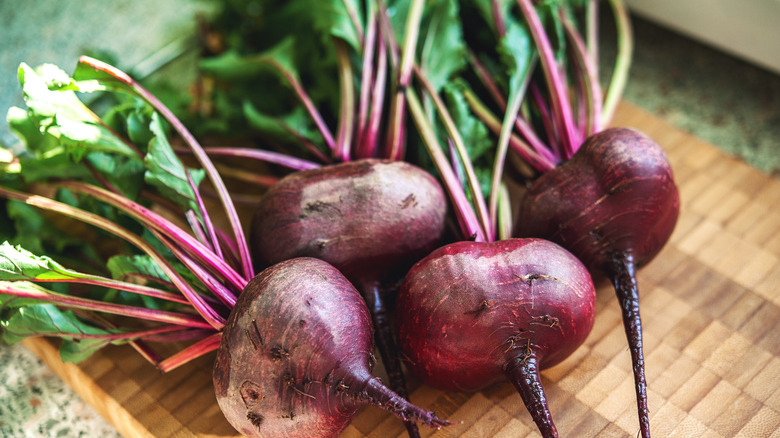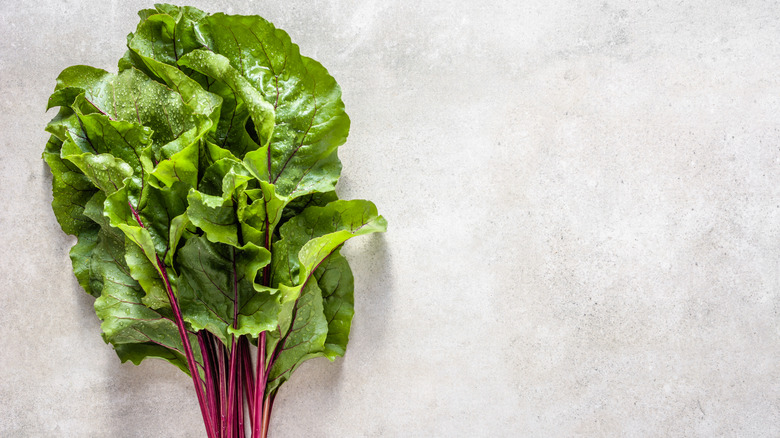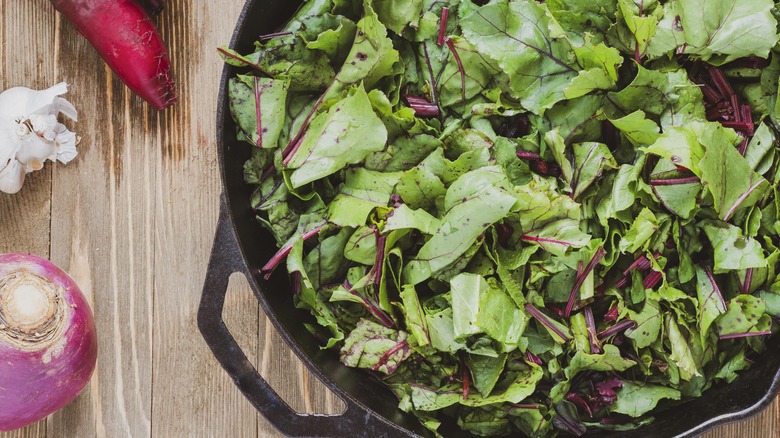You Need To Be Eating Beet Greens, Not Throwing Them Out
Beets are among the healthiest vegetables you can eat. These hearty, colorful bulbs are loaded with vitamins and minerals and deliver a number of health benefits. According to Healthline, adding beetroot to your diet provides a boost of healthy nutrients, including folate, potassium, manganese, copper, and fiber. The root vegetable also receives its distinctive rich color from its high amount of antioxidants, which have been shown to help protect against certain cancers.
Studies have shown that eating beets regularly has been linked to improved health outcomes such as lowered blood pressure, improved brain, and digestive health, reduced inflammation, and even increased energy, per Healthline. And if you are an athlete, you have yet another reason to love beets. This colorful bulb can help improve your physical performance by boosting the body's cardiorespiratory endurance, thanks to its high quantity of nitrates. Nitrates help open blood vessels and improve blood flow, which boosts lung, muscle, and even brain function, according to the Cleveland Clinic. However, while the bright beetroot is an excellent addition to your diet, it contains just a fraction of the health benefits that the beet plant has to offer.
Beet greens are highly nutritious
Many people might be inclined to purchase their beets canned in order to avoid the hassle of preparing them. And if they do prefer their beets fresh, some people might slice the greens off of the beetroot and toss them in the trash before eating or preparing the dish. But if you are only eating the beetroot by itself, then you are missing half of the vegetable's benefits.
The leafy greens that grow at the top of the beet plant are an excellent source of many nutrients. Also called beet tops, these plants contain even more nutrients than their more popular roots. Beet greens are a bountiful source of Vitamins A, K, C, and B2, as well as iron, magnesium, and calcium, according to Nutrition-and-You.com. They also contain high concentrations of the carotenoids lutein and beta-carotene, which play an essential role in maintaining good eye health. Eating beet greens has been shown to help strengthen the immune system, promote strong teeth and bones, keep skin clear and healthy, and even help improve mental health thanks to their high quantity of mood-boosting B vitamins, says Just Beet It.
Beet greens can be prepared a number of ways
Therefore, throwing away beet greens is basically just tossing vital vitamins, minerals, and nutrients straight into the trash. However, if all these health benefits have convinced you to include these healthy leafy greens in your diet, but you aren't quite sure how to prepare them, never fear. There are a number of easy ways to include this healthy vegetable in your diet.
Beet greens, like any other leaf, can be added to soups, salads, and sautees, and they have a mild, sweet flavor that lends itself well to a number of different recipes, like eggs, pasta, stews, and casseroles. Young beet greens also have a tender texture, which makes them easy to serve raw or as a simple base for a salad or bowl, burger topping, or replacement for any other leafy green, according to Love & Lemons. The Washington Post also describes combining cooked beet leaves and beetroot as "a pairing that is truly meant to be" because "the sweetness of the root balances the pleasant bitterness of the leaves." So no matter what your meal preferences may be, you are sure to find some way to enjoy this versatile and healthy green.


